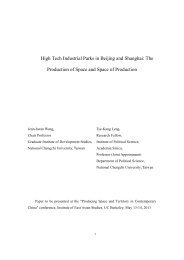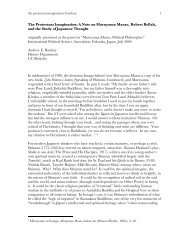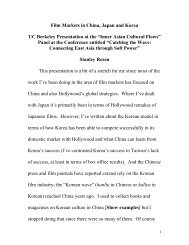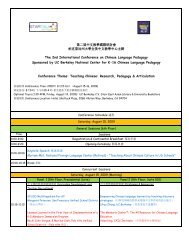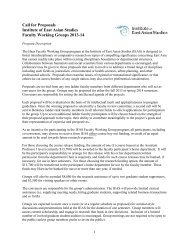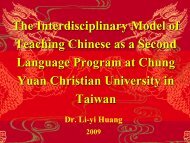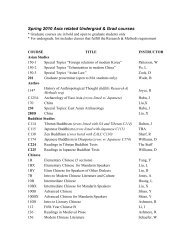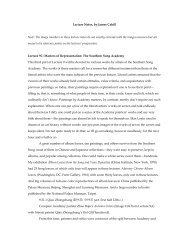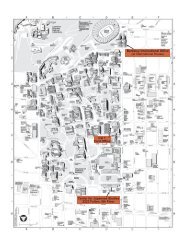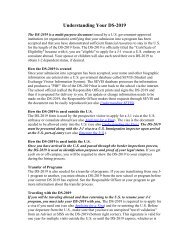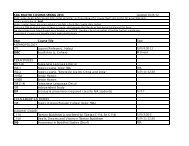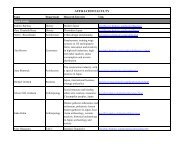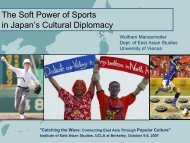Third Edition Spring 2013 - Institute of East Asian Studies, UC ...
Third Edition Spring 2013 - Institute of East Asian Studies, UC ...
Third Edition Spring 2013 - Institute of East Asian Studies, UC ...
Create successful ePaper yourself
Turn your PDF publications into a flip-book with our unique Google optimized e-Paper software.
Similarly, Chinese business tycoons’ strong financial support iscritical to the ruling Malay upper class. This situation has formeda typical patronage system, in which the powerful and the wealthyexchange resources effectively at the top, in spite <strong>of</strong> racial segregationon the lower rungs <strong>of</strong> society.In Malaysia, class divisions are systematically manipulatedwithin prevailing ethnic-based communal politics. Voices <strong>of</strong> thelower class are ignored or intentionally superseded by discourses<strong>of</strong> racial inequalities. The UMNO and the MCA, both largely representingthe elites in their respective ethnic groups, <strong>of</strong>ten use requestsfrom the lower classes as bargaining leverage against oppositionparties. To fully take advantage <strong>of</strong> ethnic Chinese citizens’favorable perceptions <strong>of</strong> China, both the UMNO and the MCA haveeagerly developed a close relationship with Beijing, as a way toshow their commitment and capability to take care <strong>of</strong> ethnic Chineseinterests in Malaysia.One <strong>of</strong> China’s most consistent policies towards Malaysiasince the establishment <strong>of</strong> diplomatic relations has been themaintenance <strong>of</strong> friendly ties with both the UMNO and the MCA.According to the records <strong>of</strong> the International Department, CentralCommittee <strong>of</strong> the CPC, in the past ten years the two sides have exchangedhigh-level delegations on an annual basis, without the involvement<strong>of</strong> the Malaysian opposition parties, regardless <strong>of</strong> ethniccomposition. 15Of course, it is also worth noting that the Malaysian Chinesewho have been making investments in China are <strong>of</strong> the same group<strong>of</strong> people who rely the most on the domestic patronage system. 16During the early years <strong>of</strong> China’s “Reform and Opening Up” policies,“overseas Chinese” was no doubt a very lucrative identity. On the15 International Department, Central Commitment <strong>of</strong> CPC, Foreign Affairs <strong>of</strong> theCPC, http://www.idcpc.org.cn/dongtai/index.htm (accessed 20 November 2012)16 By the mid-1990s, almost all the major Malaysian Chinese enterprises hadinvested in China, include Robert Kuok Hock Nien’s Kuok Brothers Sdn Bhd, WilliamCheng Heng Jem’s Lion Group, Lim Goh Tong’s Genting Group, Vincent Tan’s BerjayaCorporation Berhad, etc. Zheng Da, “Shixi Malaixiya Huashang Dui Hua Touzi De Fazhan,Wenti Yu Duice 试 析 马 来 西 亚 华 商 对 华 投 资 的 发 展 、 问 题 与 对 策 (Malaysian Chinese’sInvestment in China: Development, Problems and Policies),” Southeast <strong>Asian</strong> Affairs, No.32009 No. 139. Also see Gomez, Edmund Terence, and Jomo K. S. 1997. Malaysia’s PoliticalEconomy: Politics, Patronage, and Pr<strong>of</strong>its. Cambridge: Cambridge University Press.one hand, people in China were eager to access the resources theMalaysian Chinese had in hand: capital, technology, and access t<strong>of</strong>oreign markets and overseas networks. On the other hand, beingethnically Chinese meant they could get things done easily in Chinaby using their Chinese networks when investors elsewhere werestill suspicious <strong>of</strong> China’s prospects. Being politically vulnerableand dependent, it was believed that the ethnic Chinese in Malaysia(as in other politically unstable countries) had stronger incentivesto put their eggs in other baskets. Afraid <strong>of</strong> losing their mostimportant financial resources, the Malay-dominated governmentalso became more generous in <strong>of</strong>fering pr<strong>of</strong>itable deals to thesewealthy Chinese businessmen as long as they remained active inthe domestic patron-client relationship.Despite knowing that it is very dangerous to let a powerfulcountry like China intervene in its domestic politics by forgingclose ties with the Malaysian Chinese, visionary Malay leaders decidedto take the initiative to engage Beijing directly by refusingto allow Malaysian Chinese to act as middlemen, and by keepingthem out <strong>of</strong> state-to-state interactions. The Malaysian governmenthas actively adopted an implicitly pro-China policy in both bilateraland multilateral dialogues. In fact, Malaysia is not only the firstASEAN country that established diplomatic relations with China,but also the first country that initiated the China-ASEAN Dialogueand hosted the China-ASEAN Summit. 17 At the regional level, Malaysiahas also been playing an important role in pushing forwardmultilateral cooperation between ASEAN and China as well as otherplayers from across the Pacific. Within the framework <strong>of</strong> regionalinstitutions such as ASEAN Plus Three, the Asia Cooperation Dialogue(ACD), and the <strong>East</strong> <strong>Asian</strong> Summit (EAS), China and Malaysiahave been working quite closely with each other. 18 Nonetheless,both China and Malaysia claim overlapping territorial waters withinthe South China Sea. But unlike Vietnam and the Philippines, the17 Xinhua News Agency, “Xi Jinping Huijian Malaixiya Fuzongli Maoxiding (XiJinping Met Muhyiddin Yassin, the Deputy Prime Minister <strong>of</strong> Malaysia)”, 21 September2012, (http://news.xinhuanet.com/politics/2012-09/21/c_123747237_2.htm) (Accessed2/24/<strong>2013</strong>)18 “Joint Communique Between the People’s Republic <strong>of</strong> China and Malaysia”,30 May 2004, People’s Daily, http://english.peopledaily.com.cn/200405/30/eng20040530_144795.html (accessed 2/20/<strong>2013</strong>)13 Kankan Xie Ethnicity And China-Malaysia Relations 14



